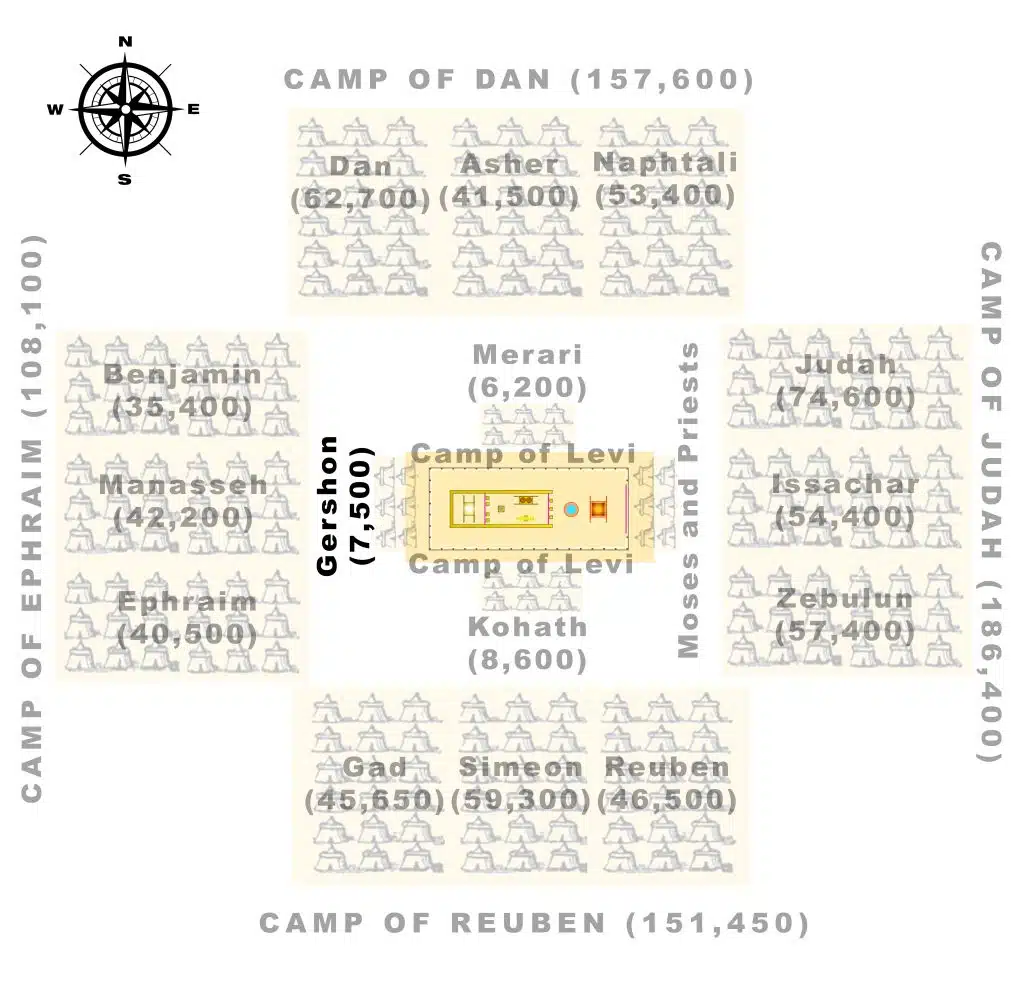The families of Gershon are listed: their numbers, their placement in the camp, their appointed leader, and their duties in service to the priests and the tabernacle.
Verses 21 – 39 give the details about the numbers and responsibilities of families of the sons of Levi. This section (verses 21 – 26) concentrates on the family of Gershon. Gershon was the first born son of Levi. In his line, there were two families, descended from the two named sons of Gershon: the family of the Libnites and the family of the Shimeites. The statement that these were the families of the Gershonites might imply that Libni and Shemei were the only two sons of Gershon.
The total number of qualified males in the two families, based on the numbering of every male from a month old and upward, was 7,500. This count of 7500 compares to the census of 108,100 men of fighting age in the camp of Ephraim (Numbers 2:24).
According to the LORD’s will, the families of the Gershonites were to camp behind the tabernacle westward. They would, therefore, provide a buffer between the tabernacle and the camp of Ephraim. The camp of Ephraim was made up of the three tribes assigned to camp on the west side of the tabernacle, being Ephraim, Manasseh, and Benjamin. The Gershonites would be the Levites on the western side.

In verse 24, the LORD appointed the leader of the fathers’ households of the Gershonites. His name was Eliasaph the son of Lael. Eliasaph means “my God has added” and Lael means “[belonging] to God.”
Verses 25 and 26 list the duties of the sons of Gershon in the tent of meeting. They were the Levites assigned the maintenance of
–The tabernacle and the tent, which refers to the main structure of the tent that was the tabernacle,
–Its covering, which would include the drapes of linen and goat hair that made up the tabernacle (Exodus 26)
–The screen for the doorway of the tent of meeting, which was a woven linen screen to cover the door of the tent (Exodus 26).
–The hangings of the court, which would include the drapes creating the outer courtyard enclosing the tabernacle, made of twisted linen, which likely meant it would be an off-white natural color (Exodus 27).
–The screen for the doorway of the court which is around the tabernacle, which would be a linen woven cloth of blue, purple, and scarlet (Exodus 27:16).
–The altar, for the sacrifices. The altar was made of bronze, and was located just in front of the doorway of the tabernacle (Exodus 27).
–Its cords which likely refers to the ropes used to secure the tent (Exodus 35:18)
This was done according to all the service concerning them. This service involved the transport, setup, and maintenance of the items listed above. All were part of the reverence and worship of God, their King with whom they had made a covenant.
Biblical Text
21 Of Gershon was the family of the Libnites and the family of the Shimeites; these were the families of the Gershonites. 22 Their numbered men, in the numbering of every male from a month old and upward, even their numbered men were 7,500. 23 The families of the Gershonites were to camp behind the tabernacle westward, 24 and the leader of the fathers’ households of the Gershonites was Eliasaph the son of Lael. 25 Now the duties of the sons of Gershon in the tent of meeting involved the tabernacle and the tent, its covering, and the screen for the doorway of the tent of meeting, 26 and the hangings of the court, and the screen for the doorway of the court which is around the tabernacle and the altar, and its cords, according to all the service concerning them.
Check out our other commentaries:
-
Ecclesiastes 1:2 meaning
Solomon uses an enigmatic metaphor to introduce the intention of the book: attempting to reconcile man’s search for meaning with the practical limitations around him....... -
Luke 5:12-15 meaning
A leper comes to Jesus, asking to be made clean. Jesus touches and miraculously heals the leper instantly. ...... -
Habakkuk 2:12–14 meaning
The LORD denounces those who commit crimes to build extravagant cities and towns. Their buildings will serve no purpose because they will be destroyed by...... -
Obadiah 1:2-4 meaning
Though Edom prides herself in her great wealth and impregnable rocky highlands, the LORD will bring her down and cut her off forever....... -
Matthew 22:37-38 meaning
Jesus answers the lawyer’s question about the great commandment. He tells Him it is this: “You shall love the Lord your God with all your......



